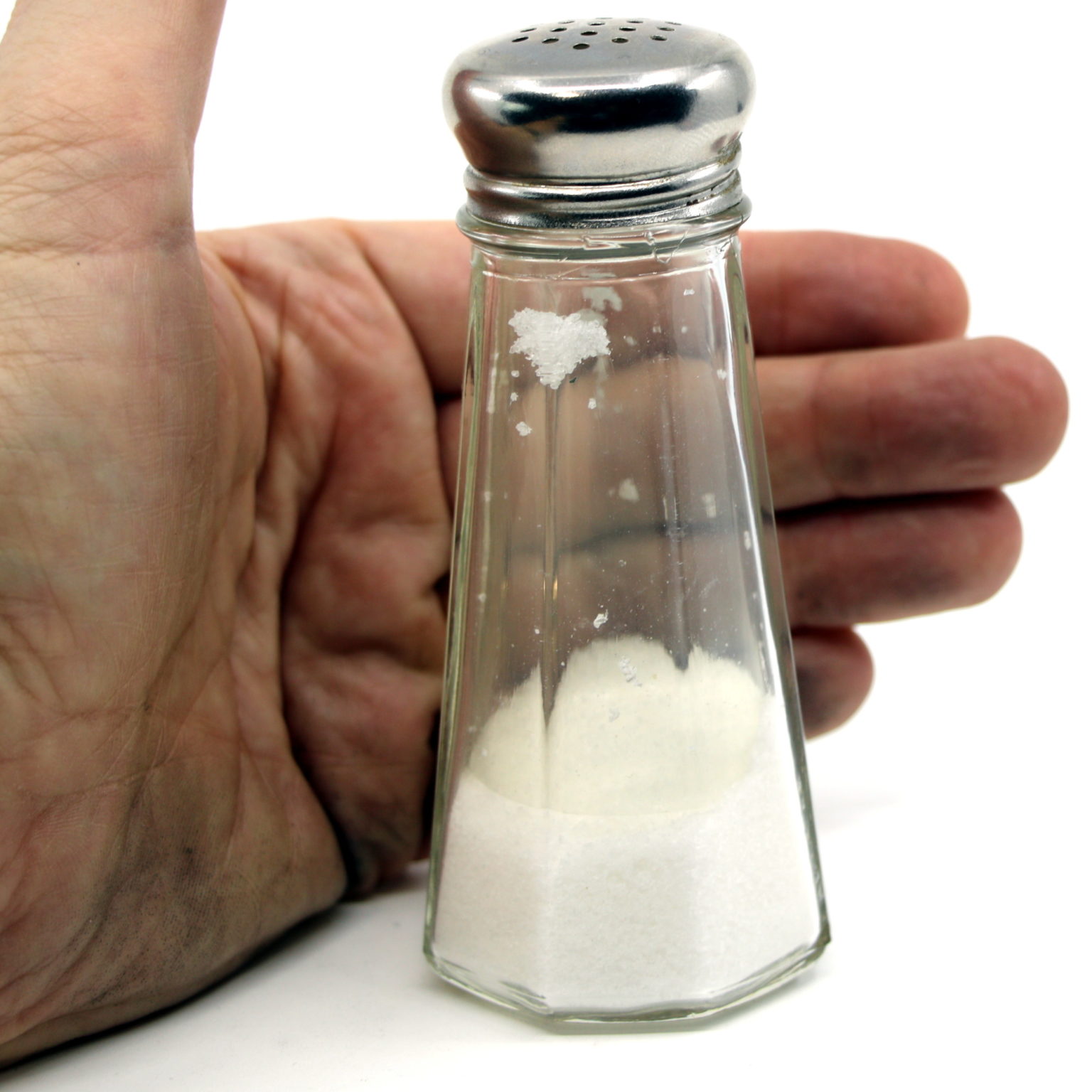Is The Salt Trick Real? Unveiling The Truth Behind This Popular Myth
Is the salt trick real? This question has been a topic of curiosity for many people, especially those who have heard about its supposed ability to repel spiders, ants, or even negative energy. From ancient folklore to modern-day home remedies, salt has long been associated with various mystical and practical uses. But does it really work? In this article, we’ll dive deep into the science, history, and cultural significance of the salt trick to uncover whether it holds any truth or is merely a myth.
Many people swear by the salt trick, claiming it can solve problems ranging from pest control to spiritual cleansing. However, others dismiss it as an old wives' tale with no scientific backing. Whether you’re here to debunk the myth or validate its effectiveness, this article will provide you with all the information you need to make an informed decision. By the end, you’ll understand the origins, applications, and realities of the salt trick.
In today’s world, where misinformation spreads quickly, it’s essential to separate fact from fiction. The salt trick is no exception. With the rise of social media and online forums, many unverified claims have gained traction. To address this, we’ll explore expert opinions, scientific studies, and real-life examples to determine whether the salt trick is a legitimate solution or just another urban legend. Let’s get started!
Read also:Is Wang Ziqi Married Everything You Need To Know About Her Relationship Status
Table of Contents
- What is the Salt Trick?
- Historical Background of the Salt Trick
- Scientific Explanation Behind the Salt Trick
- Common Uses of the Salt Trick
- Does Salt Repel Pests?
- The Spiritual Significance of Salt
- Cultural Variations of the Salt Trick
- Debunking Myths About the Salt Trick
- What Do Experts Say?
- Conclusion: Is the Salt Trick Real?
What is the Salt Trick?
The salt trick refers to the practice of using salt for various purposes, ranging from practical to mystical. One of the most common claims is that sprinkling salt can repel pests like spiders, ants, and other insects. Others believe that salt can ward off negative energy or even break curses. While the methods of application vary, the underlying principle is the same: salt is believed to possess properties that make it effective for these purposes.
There are several variations of the salt trick. For example, some people sprinkle salt around doorways and windows to prevent pests from entering their homes. Others use salt in spiritual rituals, such as placing it in corners of a room to cleanse the space of negative energy. Despite its widespread use, the effectiveness of these practices remains a subject of debate.
Historical Background of the Salt Trick
Salt has been an integral part of human history for thousands of years. In ancient times, it was considered a valuable commodity, often used as currency. The phrase "worth its weight in salt" originates from this period, highlighting its importance. Beyond its practical uses, salt also held symbolic significance in various cultures.
In many traditions, salt was believed to have protective and purifying properties. For instance, in Roman culture, salt was used in religious ceremonies to ward off evil spirits. Similarly, in Japanese folklore, salt is scattered at the entrance of a home to cleanse it of negative energy. These historical practices laid the foundation for modern-day salt tricks.
Scientific Explanation Behind the Salt Trick
To determine whether the salt trick is real, we need to examine it from a scientific perspective. Salt, chemically known as sodium chloride, is a naturally occurring compound with several properties that make it useful in various applications. For example, its ability to absorb moisture makes it effective in dehumidifying environments.
When it comes to pest control, salt can indeed have an impact. For instance, ants and other small insects are deterred by salt because it dehydrates their bodies. However, the effectiveness of salt as a pest repellent depends on the quantity used and the specific pest being targeted. It’s also worth noting that excessive use of salt can harm plants and soil, making it an impractical long-term solution.
Read also:Remote Iot Vpc Ssh Raspberry Pi Free A Comprehensive Guide
Common Uses of the Salt Trick
The salt trick is employed for a variety of purposes, both practical and mystical. Below are some of the most common uses:
- Pest Control: Sprinkling salt around entry points to deter ants and spiders.
- Spiritual Cleansing: Using salt in rituals to remove negative energy from a space.
- Dehumidification: Placing salt in damp areas to absorb excess moisture.
- Health Remedies: Gargling with saltwater to relieve sore throats.
Does Salt Repel Pests?
One of the most popular claims about the salt trick is its ability to repel pests. While there is some truth to this, it’s important to understand the limitations. Salt can indeed deter certain pests, such as ants and slugs, because it disrupts their bodily functions. However, it’s not a one-size-fits-all solution.
For example, salt is effective against ants because it dehydrates them. When ants come into contact with salt, they lose moisture and eventually die. However, this method is not practical for large infestations. Additionally, salt can damage surfaces and harm plants, making it unsuitable for widespread use.
The Spiritual Significance of Salt
In many cultures, salt is considered a powerful spiritual tool. It is often used in rituals to cleanse spaces, protect against evil spirits, or break curses. For instance, in Wiccan traditions, salt is used to create a protective circle during ceremonies. Similarly, in Hindu rituals, salt is sometimes added to holy water for purification purposes.
While there is no scientific evidence to support these spiritual claims, the belief in salt’s mystical properties persists. This is likely due to its historical significance and the symbolic meaning it holds in various cultures.
Cultural Variations of the Salt Trick
Different cultures have unique interpretations of the salt trick. In some Asian countries, salt is thrown over the shoulder to ward off bad luck. In Mediterranean traditions, salt is placed under a mattress to ensure a restful sleep. These practices reflect the diverse ways in which salt is perceived and utilized around the world.
Below is a table summarizing the cultural variations of the salt trick:
| Culture | Practice | Purpose |
|---|---|---|
| Japanese | Scattering salt at entrances | To cleanse negative energy |
| Roman | Using salt in religious ceremonies | To ward off evil spirits |
| Wiccan | Creating a protective circle | To ensure safety during rituals |
Debunking Myths About the Salt Trick
Despite its popularity, the salt trick is surrounded by several myths. One common misconception is that salt can completely eliminate pests from a home. While it may deter certain insects, it is not a comprehensive solution. Another myth is that salt can break curses or protect against supernatural forces. While these beliefs are culturally significant, they lack scientific evidence.
It’s important to approach the salt trick with a critical mindset. While it may have some practical applications, it’s not a magical cure-all. Understanding its limitations will help you use it more effectively.
What Do Experts Say?
Experts in pest control and chemistry have weighed in on the salt trick. According to entomologists, salt can indeed repel certain pests, but its effectiveness is limited. For example, while it may deter ants, it won’t eliminate an entire colony. Similarly, chemists explain that salt’s dehydrating properties make it useful for absorbing moisture, but it’s not a substitute for professional dehumidifiers.
When it comes to spiritual claims, experts in anthropology and religious studies emphasize the symbolic importance of salt. While it may not have magical powers, its cultural significance cannot be ignored. These expert opinions provide a balanced perspective on the salt trick.
Conclusion: Is the Salt Trick Real?
In conclusion, the salt trick is partially real, depending on the context. From a scientific standpoint, salt can repel certain pests and absorb moisture, making it useful for specific applications. However, its effectiveness is limited, and it should not be relied upon as a comprehensive solution. On the other hand, its spiritual uses are rooted in cultural traditions and symbolism rather than empirical evidence.
Whether you’re using salt for pest control or spiritual cleansing, it’s important to understand its limitations and applications. By combining traditional practices with modern knowledge, you can make the most of this versatile compound. If you found this article helpful, feel free to share it with others or leave a comment below. For more insights, check out our other articles on home remedies and cultural practices!
Fortnite Unblocked: How To Access And Play The Game Anywhere
Who Is Abu Mudarris? Unveiling The Life And Legacy Of A Renowned Islamic Scholar
Is Bobby Portis Married? A Comprehensive Look At His Personal Life

Mastering The Blue Salt Trick For Men A Comprehensive Guide

Vanishing Salt Trick (Improved) by Al Baker